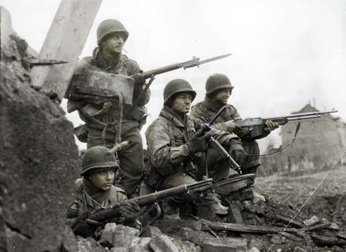
-
HOME
-
WHAT IS STANDOur Mission Our Values Our Help Contact
-
WHAT WE FIGHT FORReligious Freedom Religious Literacy Equality & Human Rights Inclusion & Respect Free Speech Responsible Journalism Corporate Accountability
-
RESOURCESExpert Studies Landmark Decisions White Papers FAQs David Miscavige Religious Freedom Resource Center Freedom of Religion & Human Rights Topic Index Priest-Penitent Privilege Islamophobia
-
HATE MONITORBiased Media Propagandists Hatemongers False Experts Hate Monitor Blog
-
NEWSROOMNews Media Watch Videos Blog
-
TAKE ACTIONCombat Hate & Discrimination Champion Freedom of Religion Demand Accountability
A Case for Faith
During a rare moment of talking about the war, my father told us a story from his days as a U.S. infantryman on the front lines in Europe. It was a hard story for him to tell.
As a veteran of some of the most blood-stained battles of the war, he had witnessed the deaths of many of his friends and fellow soldiers. One quiet night, before the next day’s advance, Dad became certain he would follow them and die the next day.

Like so many soldiers before him, he wrote a letter to his wife, to be mailed after his death. He then went to his captain and volunteered to be “on point” the next day—the first soldier leading a column of men into whatever horrors were ahead—the position with the highest probability of taking first gunfire.
He then went back to his foxhole and prayed. Prayed for God to look after his wife and children, prayed for his fellow soldiers, prayed for peace. My father’s eyes brightened with tears as he recalled what happened next. “A great calm came over me. I felt close to some tremendous power. I had the unmistakable sense that somehow my prayers had been heard.”
The next morning, on point, my father was indeed the first to be hit. Fortunately for me, as I had yet to be conceived, Dad survived, was awarded a Purple Heart and sent behind lines for 6 weeks of recuperation.
I tell this story now as an example of “faith.” Faith is a trust and confidence in something beyond the boundaries of the physical universe. We all recognize it to some degree, and we see it everywhere. Faith in family. Faith in generosity. Faith in friendship. Faith in oneself.
But where does faith come from? Is it learned? Is it something we are born with? Does it require a religious concept to define it?
Was it easier for my father to find God when he needed him most because he had been raised religious? Dad certainly thought so. Through his religion, he had been taught to believe in the existence of a greater force. And when he needed it, that source of power was there for him.
Since the dawn of Man, that is what faith has meant: the belief in ourselves as spiritual beings, with an ability to rise above the limitations of the physical universe and, through God or whatever you might call that force, achieve a higher state of awareness and ability.
Over the ages, philosophers and priests have worked to interpret the infinite in its many forms—to know the unknowable and bring that knowledge to their people.
Some pervert this knowledge and use it as a control mechanism, enslaving the free will of Man. Many others use it to bring the lights of charity, love and redemption to their fellows. That is how faith has built civilizations. But confusion and uncertainty about faith is leading some to accept a new “gospel.” Claiming to follow a “scientific” approach, the priests of this new gospel promote the concept that creativity, ideals, love, and even faith and spiritual beliefs are all purely products of brain function.
It’s a fallacy. But that fallacy has made it popular to knock all religion—to take aim at traditional symbols and elements which do not jive with “scientific” thought, or to single out small factions or idiots who practice evil in the name of the faith they pretend to represent, and so they attempt to charge the whole religion with the sins of the few.
But a primary purpose of every organized religion is to provide care and hope to its parishioners and others everywhere. Religion, at its best, encourages faith and seeds endless good works in this world. A great religion protects human rights. It provides its parishioners with fellowship, comfort, charity and a path to spiritual enlightenment.

Faith is real. Faith is attainable. Faith can be learned and applied to create a richer life for one and all.
My father’s story touched me deeply. One day, in 1971, I had a similar experience of my own–one of great calm, clarity and a sense of connection with a higher power. My world was bright and imbued with unlimited potential.
This was not a peril-of-death moment. It was a spiritual awakening that occurred inside a small, quiet classroom where I was studying Scientology. In an instant, my life changed forever. Since then, with the help of my religion, such moments of profound faith have become commonplace for me.
I wish the same for you.









